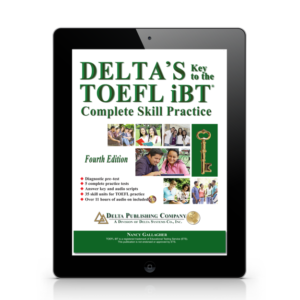Start Here: Your To Do List
Priority #1 (1 hours) Finish the Diagnostic Test for Reading and Listening
The video below shows you how to find the particular Diagnostic Test. Before you start, you should…
- have a good breakfast.
- go to the bathroom.
- turn off your phone and close any and all distracting programs on your computer (Facebook, Skype, Messenger, email…).
- get paper and a few pens/pencils for taking notes.
To mimic real TOEFL conditions, start with Reading and proceed in order through each Listening passage.
Be disciplined: don’t go to the bathroom, check your email, or use a dictionary.
Priority #3 (15 minutes) View / Print Your Diagnostic Results
My first video presentations teach you how to calculate your Reading and Listening scores. In the long run, this saves you so much money, so even though it may seem silly, it’s a really valuable skill!
You will need your results for all 3 Reading and all 6 Listening passages from the Diagnostic Test. If I have time to get them out of the website and put them into the same format that you see in my videos, you can wait for that.
Priority #4 (10 hours) Watch my presentations
Realistically, you will need 1-3 weeks to watch the presentations. The best way to benefit is to watch 1 or 2 videos, and then practice the concepts that I discuss. That way, you build your skills as you go.
Watch the video classes in order.
Follow along. It’s not just a passive process. You must take action!
Do the activities.
Take notes while you watch.
Organize your notes.
Priority #5 (8 hours per week) finish the chapters of Delta's Key for Reading and Listening OR TPO
Your scores will improve because you take action and practice the protocols that I introduce in my presentations.
You can use BestMyTest or various TPO websites. Those are not my websites and I am not responsible for anything on them. They are reliable sources of realistic practice.
When students need to build skills with correctly choosing answers for individual types of questions (for example, if you regularly miss points on the final Prose Summary question), I suggest they study the relevant chapters of Delta’s Key to the TOEFL iBT. If you have questions about whether or not it would be useful for you to finish Delta’s Key, please send me an email. I’m happy to discuss it with you.
Priority #6 (2 hours each week) Memorize vocabulary using "Spaced Repetition"
Memorizing vocabulary is time-consuming. That is the main reason why students avoid taking it seriously for as long as possible. If you’re anything like most of the students who studied with me, you probably need to learn hundreds of new words.
The best way to approach this process is to slowly chip away at it.
✅ Here's an effective way to spend 2 hours a week memorizing vocabulary

❌ Here's an ineffective way to spend 2 hours a week memorizing vocabulary

Priority #7 (2 hours weekly) Calculate your score after taking a realistic practice test
This should be a realistic, timed practice test, like from TPO or BestMyTest.com.
You should not take any breaks during the practice test. It’s also very wise to simulate the kind of distractions that happen in a real test environment — where 2 people are quietly talking nearby.
Keep all of your answer choices and calculate your scores.
My students who get the biggest improvements in their scores have dozens of the kind of Score-Tracking document that I’m showing you in the picture below.
